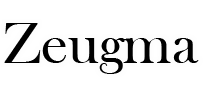Season 1 | Episode 6: "CCCCing"
This week's episode comes to you from the 2013 Conference on College Composition and Communication in Las Vegas, NV. Zeugma team members and guest contributors sit down to interview four scholars and conference attendees doing remarkable work at the intersections of rhetoric, composition, and technology. Those interviewees: Drs. Jim Brown, Ron Brooks, Jenny Rice, and Kathleen Blake Yancey.
The episode can be streamed via the player below or downloaded via iTunes and our LibSyn profile.
image via Wikimedia Commons
Episode Producer: Eric Detweiler
The 2013 Conference on College Composition and Communication (CCCC) took place from March 13-16 in Las Vegas, Nevada. While attending the conference, Zeugma team members and other guest contributors from the Digital Writing and Research Lab interviewed four scholars in rhetoric and composition doing remarkable work at the intersections of rhet/comp, pedagogy, and technology.
First, Eric Detweiler talks with Kathleen Blake Yancey, an English professor at Florida State University and editor of the journal College Composition and Communication. Dr. Yancey talks about her current work with "everyday writing," focusing especially on the "Crusaders," a group of young Japanese-American women who--among many other things--wrote copiously to Japanese-American servicemen during World War II.
Next, DWRL assistant director Megan Gianfagna talks with the University of Kentucky's Jenny Rice. They discuss the spatial and rhetorical construction of Austin, TX, and Las Vegas, as well as Dr. Rice's pedagogical practices and her 2012 book Distant Publics.
Eric then talks with Dr. Ron Brooks, an associate professor and writing program administrator at Oklahoma State University. Brooks talks about his work with "postcomposition" and "postprocess theory," as well as parallels between culinary and linguistic mastery that he explores in a Pre/Text article on the television show Top Chef Masters.
Finally, DWRL staffer Stephanie Odom chats with Jim Brown of the University of Wisconsin-Madison. He talks about his students' remediated digital versions of the classical progymnasmata, an upcoming book on ethics and software entitled Ethical Programs, and a more distant project that mashes up rhetorical theorists from disparate historical contexts. (For more from Jim Brown, including an extended discussion of one of his students' digital progymnasmata, you can check out the episode preview we posted last week.)
Interspersed throughout the episode are some of the sounds of Las Vegas: its monorail, casinos, and the Hoover Dam.



